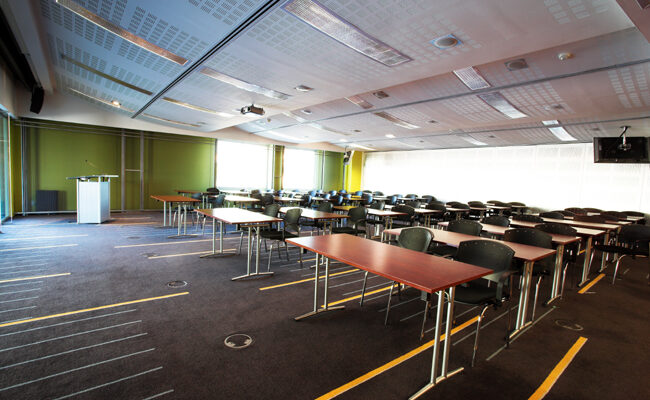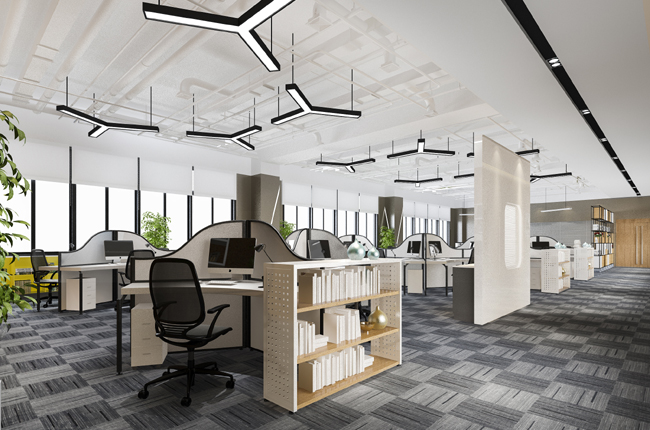
A contract carpet, also known as commercial carpet, is the type of carpet that’s often used in places like hospitals, learning institutions, hotels, and offices. It’s usually thicker than the carpets used in residential settings, and it’s mostly purchased and used in bulk.
Manufacturers concentrate more on the comfort aspect when it comes to residential carpets, but durability is the main focus of contract carpets. A heavy duty contract carpet is designed with long-lasting materials, enabling it to endure heavy foot traffic and regular cleaning. Contract carpets lack variety when it comes to color. Rarely will you find bright-colored contract carpets as you would in residential carpets. However, you won’t miss a color that matches the environment where you want it installed.
Here are some things you should know about contract carpets:
Broadlooms And Tile Carpets
Contract carpets are either wall to wall (also known as broadloom) or in the form of tiles. Broadlooms are carpets that come in wide, long rolls and are of a higher quality than carpet tiles. They’re versatile and provide a seamless overall appearance. They also enable the use of large-scale patterning. They cost more, both in price and installation.
Carpet tiles, also known as carpet squares or modular carpets, are square pieces of carpet cut from broadloom carpets. The squares are then fitted together using adhesive material to form a larger carpet. They’re cheaper, but they take time to install. You’re bound to end up with a lot of waste during installation, especially when trying to cut the right sizes to fit into certain places. Some manufacturers have come up with other shapes of carpet tiles like triangles and hexagons. They’re most suited in places that require high maintenance because they can be easily replaced.
Materials Used To Make Contract Carpets
There are many types of fiber used to make carpets, but contract carpets are mostly made from synthetic fiber like nylon, polypropylene, and polyolefin.
Nylon Carpets
Carpets made from nylon are the most durable and expensive. They’re mostly installed in places with high foot traffic. They can maintain their integrity between five to ten years without exhibiting signs of wear. They’re low-maintenance and are resistant to mold and mildew. They, however, are highly absorbent and have a low ability to resist stains. They’re mostly found in high-end offices.
Polypropylene And Polyolefin Carpets
Carpets made from polypropylene and polyolefin are mostly used in places with low to medium foot traffic. These carpets don’t absorb liquid and are resistant to stains. They’re less resilient and are usually replaced within a shorter time. They’re less expensive than their nylon counterparts.
Make And Color
Carpet making undergoes several processes, including the formation of the fibers and dyeing. Contract carpets’ ability to maintain their resilience and color is determined by the way they’re made and the way the dye is applied.
Woven carpets are made using a loom, which enables the top side yarn to interlace with the bottom yarn. They’re preferred for high-traffic areas because they tend to last longer. Tufted carpets are made by inserting pile yarns into a backing material by way of a needle. Tufted carpets wear at a much faster rate and are likely to crush under pressure. They’re mostly installed in places with moderate foot traffic.
Carpets are either post-dyed or pre-dyed. The common methods of dying yarn used in carpet making are solution dyeing and piece dyeing. In the solution dyeing process, fresh polyester and color are mixed before being made into filaments. The filaments are then twisted into yarn, which are used to make the carpet. However, in the piece dyeing process, the dye is applied after the carpet has been constructed.
Carpets that are solution-dyed have a high resistance to fade as compared to the piece-dyed.

Maintenance And Cleaning
The cleanliness of carpets in your organization contributes to how you’re perceived. Worn-out, frayed, and dirty carpets impact your organization negatively. Carpets are susceptible to dirt; they also store mites, absorb stains, and others. If neglected and not cleaned for a considerable period, carpets may turn into health hazards.
Carpets need to be vacuumed frequently and cleaned professionally. It’s imperative to only hire professionals who’ll clean with the right equipment and minimize wear and tear. Deep cleaning for commercial carpets is recommended every four to six months. And apart from maintaining cleanliness, frequent cleaning of the carpet prolongs its life.
Strive to keep the outdoors clean and provide door mats at entry points to help control the amount of dirt transported to the carpets by visitors.
Conclusion
If you’re planning to buy contract carpets, you should be guided by the amount of foot traffic where it’ll be installed, the length of time you want to keep the carpet, and your budget.
Contract carpets are costly and need proper maintenance to prolong their life. The quality of the contract carpet you choose will be determined by affordability before other factors. However, you should keep in mind that what may seem affordable today may actually cost you tomorrow. Contract carpets are meant to stay for long, and changing them after a short period will be time-consuming and costly. You should carefully weigh in on the quality as well.
Leave a Reply